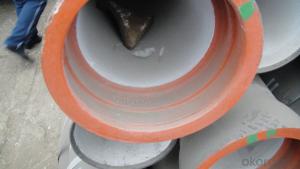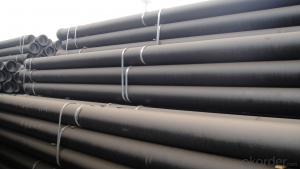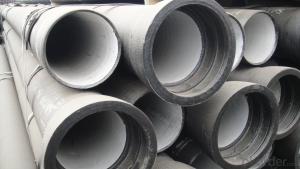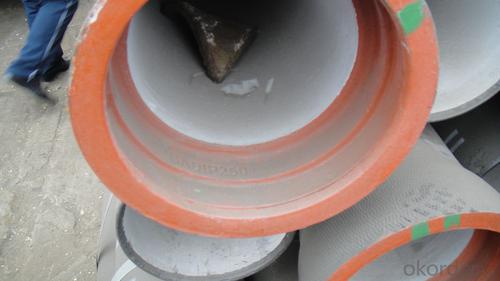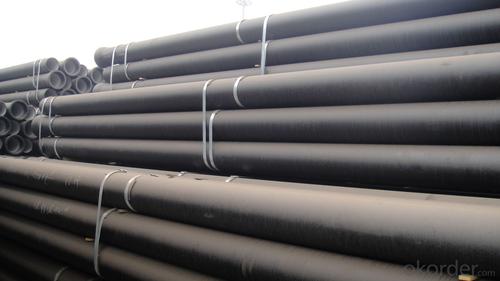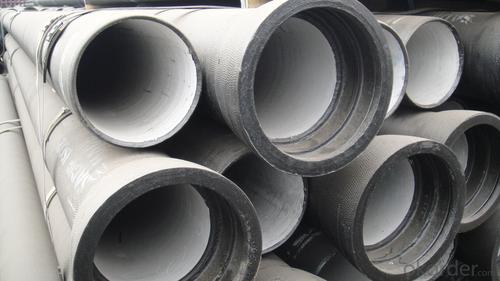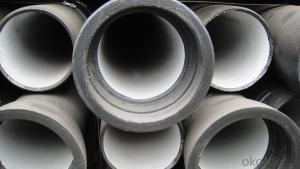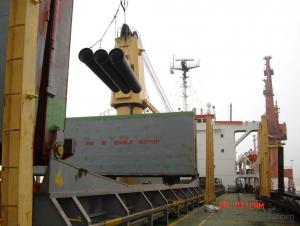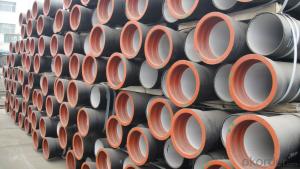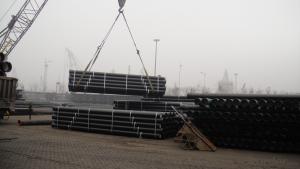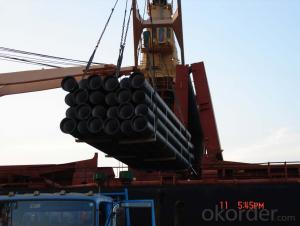Ductile Iron Pipe For Water Project Made In China On Sale
- Loading Port:
- Tianjin
- Payment Terms:
- TT OR LC
- Min Order Qty:
- 50 pc
- Supply Capability:
- 5000 pc/month
OKorder Service Pledge
OKorder Financial Service
You Might Also Like
1. hydraulic hose crimping machine in Electrical equipment&supplies
Specifications
High pressure hose to the winding wire matrix, skin coated refractory coating layer steel braided flame retardant layer
APPLICATIONS:It is mainly used in high temperature surroundings and in conditions having heat source or heat radiation source,such as oil field well-control,metal smelt,and chemical industry.
Inner Diameter of Hose mm | Inside Diameter | Reinforcement Diameter (mm) | Outside Diameter (mm) | Work Pressure (MPa) | Proof Pressure (MPa) | Minimum Explosive Pressure (MPa) | Minimum Bending Radius mm | Refractory °C | |||
Mpa | Psi | MPa | Psi | Mpa | Psi | ||||||
φ13(1/2") | 13±0.5 | 22.2±0.8 | 44±1.06 | 43 | 6230 | 64.5 | 9435 | 86 | 12460 | 230 | 750 |
φ16(5/8") | 16±0.5 | 26±0.8 | 47±1.5 | 38 | 5506 | 57 | 8259 | 76 | 11012 | 260 | 750 |
φ19(3/4") | 19±0.5 | 30±0.8 | 52±1.5 | 34.5 | 4999 | 51.75 | 7498 | 69 | 9998 | 300 | 750 |
φ25(1") | 25±0.8 | 36±0.8 | 59±1.5 | 27.5 | 3984 | 41.25 | 5976 | 55 | 7968 | 360 | 750 |
φ32(5/4") | 32±0.8 | 44±0.8 | 69±2.0 | 20.5 | 2970 | 30.75 | 4455 | 41 | 5940 | 470 | 750 |
φ38(3/2") | 38±1.0 | 76±2.0 | 87.2±5.1 | 17 | 2463 | 25.5 | 3694 | 34 | 4926 | 570 | 750 |
φ51(2") | 51±1.0 | 91±2.0 | 100.7±5.1 | 17 | 2463 | 25.5 | 3695 | 34 | 4926 | 740 | 750 |
2. Antiflaming,fire-resistance rubber hose assembly
Specifications
High pressure hose to the winding wire matrix, skin coated refractory coating layer steel braided flame retardant layer and laye
APPLICATIONS:It is mainly used in high temperature surroundings and in conditions having heat source or heat radiation source,such as oil field well-control,metal smelts,and chemical industry
Inner Diameter of Hose mm | Inside Diameter | Reinforcement Diameter (mm) | Outside Diameter (mm) | Work Pressure (MPa) | Proof Pressure (MPa) | Minimum Explosive Pressure (MPa) | Minimum Bending Radius mm | Refractory °C | |||
Mpa | Psi | MPa | Psi | Mpa | Psi | ||||||
φ13(1/2") | 13±0.5 | 22.2±0.8 | 44±1.06 | 43 | 6230 | 64.5 | 9435 | 86 | 12460 | 230 | 750 |
φ16(5/8") | 16±0.5 | 26±0.8 | 47±1.5 | 38 | 5506 | 57 | 8259 | 76 | 11012 | 260 | 750 |
φ19(3/4") | 19±0.5 | 30±0.8 | 52±1.5 | 34.5 | 4999 | 51.75 | 7498 | 69 | 9998 | 300 | 750 |
φ25(1") | 25±0.8 | 36±0.8 | 59±1.5 | 27.5 | 3984 | 41.25 | 5976 | 55 | 7968 | 360 | 750 |
φ32(5/4") | 32±0.8 | 44±0.8 | 69±2.0 | 20.5 | 2970 | 30.75 | 4455 | 41 | 5940 | 470 | 750 |
φ38(3/2") | 38±1.0 | 76±2.0 | 87.2±5.1 | 17 | 2463 | 25.5 | 3694 | 34 | 4926 | 570 | 750 |
φ51(2") | 51±1.0 | 91±2.0 | 100.7±5.1 | 17 | 2463 | 25.5 | 3695 | 34 | 4926 | 740 | 750 |
3. hydraulic hose Universal Wire-braided DN6
Quick Details
· Place of Origin: Hebei, China (Mainland)
· Brand Name: CMAX/CNBM
· Model Number: GB/T3683-92
Packaging & Delivery
Packaging Details: | hydraulic hose is wrapped with fabrics |
Delivery Detail: | 80000meters/30days |
Specifications
Universal Wire-braided Hydraulic Hose, Q/FLT01-AStandard GB/T3683-92, Temperature range: -40 to +100
Universal Wire-braided Hydraulic Hose
Q/FLT01-AStandard GB/T3683-92
Tube: oil resistant synthetic rubber
Reinforcement: 1 W/B (one high tensile steel wire braid)
Cover: abrasion and weather resistant synthetic rubber
Temperature range: -40 to +100.
4. Drilling Rubber Hose
Quick Details
· Place of Origin: Hebei, China (Mainland)
· Brand Name: CMAX/CNBM
Packaging & Delivery
Packaging Details: | Package: plastic films, then wrapped with fabrics |
Delivery Detail: | According to the Quantity |
Specifications
Drilling hose
DN |
Hose I.D | Wire O.D |
Hose O.D |
Working Pressure | Burst Pressure | Minimum Bend Radius | Weight | Length | |||
inch | mm | mm |
mm | MPa | psi | MPa | psi | mm | kg/m | metres | |
5 | 3/16 | 4.8 | 9.5 | 11.8 | 25.0 | 3630 | 100.0 | 14280 | 89 | 0.19 | 50/100 |
6 | 1/4 | 6.4 | 11.1 | 13.4 | 22.5 | 3270 | 90.0 | 12840 | 102 | 0.21 | 50/100 |
8 | 5/16 | 7.9 | 12.7 | 15.0 | 21.5 | 3120 | 85.0 | 12280 | 114 | 0.24 | 50/100 |
10 | 3/8 | 9.5 | 15.1 | 17.4 | 18.0 | 2615 | 72.0 | 10280 | 127 | 0.33 | 50/100 |
13 | 1/2 | 12.7 | 18.3 | 20.6 | 16.0 | 2320 | 64.0 | 9180 | 178 | 0.41 | 50/100 |
16 | 5/8 | 15.9 | 21.4 | 23.7 | 13.0 | 1890 | 52.0 | 7420 | 203 | 0.45 | 50/100 |
19 | 3/4 | 19.0 | 25.4 | 27.7 | 10.5 | 1530 | 42.0 | 6000 | 241 | 0.58 | 50/100 |
25 | 1 | 25.4 | 33.3 | 35.6 | 8.8 | 1280 | 35.0 | 5020 | 305 | 0.88 | 50 |
32 | 11/4 | 31.8 | 40.5 | 43.5 | 6.3 | 920 | 25.0 | 3600 | 419 | 1.23 | 20/40 |
38 | 11/2 | 38.1 | 46.8 | 50.6 | 5.0 | 730 | 20.0 | 2860 | 508 | 1.51 | 20/40 |
51 | 2 | 50.8 | 60.2 | 64.0 | 4.0 | 580 | 16.0 | 2280 | |||
5. Concrete pump rubber hose
Quick Details
· Place of Origin: Hebei, China (Mainland)
· Brand Name: CMAX/CNBM
Packaging & Delivery
Packaging Details: | Package: plastic films, then wrapped with fabrics |
Delivery Detail: | According to the Quantity |
Specifications
Specifications
High Quality Concrete Pump Delivery Rubber Hose
1.high quality
2.ISO9001:2008
3.reasonable price
1. Material: Black NR and BR synthetic rubber .
2.Reinforcement:Spiral textile/steel wire.
3. Widely application: Schwing PM SANY Zoomlion and other brand concrete pump trucks.
4.Cover:Abrasion resistantant,heat and ozone resistant.
5.Inside diameter:50-152mm
6.Working pressure:8.5 MPA.
7.Detailed specification:
No | Description | ID | OD | Plies | Working Pressure | Burst Pressure | Weight |
1 | 2 inch | 50mm | 70mm | 2 | 8.5MPA 1200PSI | 20MPA 3000PSI | 3.5kgs |
2 | 2.5 inch | 63mm | 88mm | 2 | 8.5MPA 1200PSI | 20MPA 3000PSI | 4.9kgs |
3 | 3 inch | 76mm | 102mm | 2 | 8.5MPA 1200PSI | 20MPA 3000PSI | 6.5kgs |
4 | 4 inch | 100mm | 130mm | 2 | 8.5MPA 1200PSI | 20MPA 3000PSI | 9.3kgs |
5 | 5 inch | 125mm | 155mm | 2 or 4 | 8.5MPA 1200PSI | 20MPA 3000PSI | 10.9kgs |
6 | 6 inch | 152mm | 184mm | 2 | 8.5MPA 1200PSI | 20MPA 3000PSI | 13.3kgs |
.
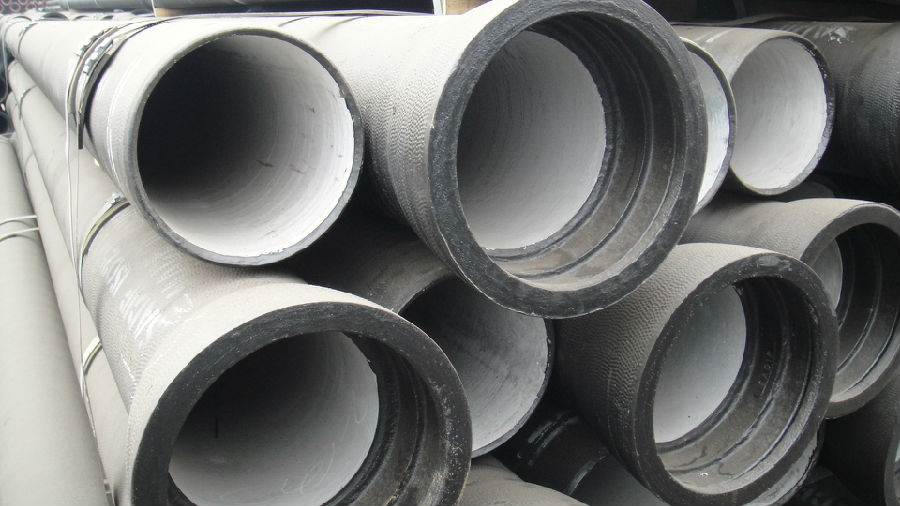
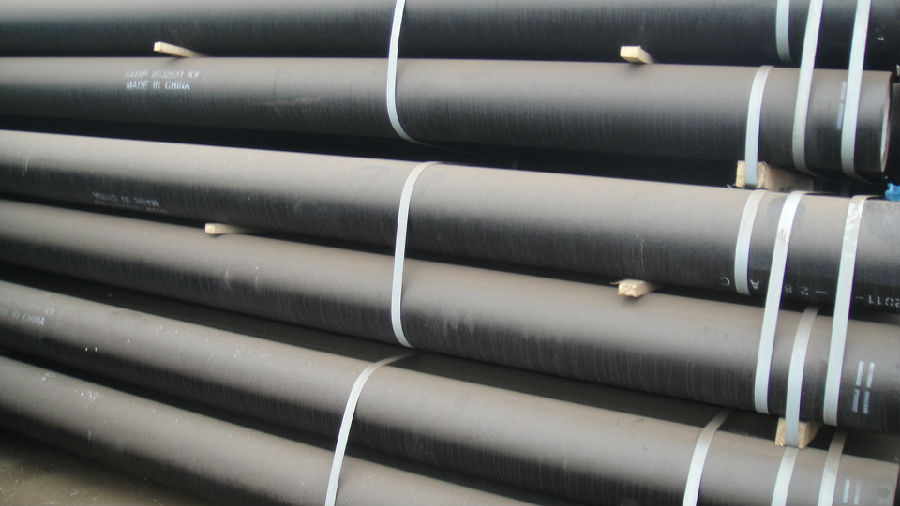
- Q: What is the expected service life of ductile iron pipe?
- The expected service life of ductile iron pipe can vary depending on various factors such as the environment, soil conditions, water quality, and the level of maintenance and corrosion protection measures implemented. However, on average, ductile iron pipe is designed to have a service life of 75 to 100 years. This is due to its superior strength, durability, and resistance to corrosion. Ductile iron pipe is known for its ability to withstand harsh conditions and has been used extensively in water and wastewater systems, industrial applications, and other infrastructure projects. Regular maintenance and proper corrosion protection can further extend the service life of ductile iron pipe, ensuring its continued reliability and performance over many decades.
- Q: What is the expected fatigue life of ductile iron pipes under cyclic loading?
- The fatigue life of ductile iron pipes under cyclic loading can vary due to factors such as the magnitude and frequency of the loading, material quality, pipe design and installation, and environmental conditions. Ductile iron possesses high strength and ductility, enabling it to withstand cyclic loading to a certain extent. However, like any material, it is susceptible to fatigue failure over time. Engineers commonly employ fatigue analysis and testing methods to estimate the expected fatigue life of ductile iron pipes. These methods involve subjecting representative samples of the pipes to controlled cyclic loading and determining the number of cycles required for failure. The results of these tests can then be used to extrapolate the expected fatigue life of the pipes under similar loading conditions. It is important to note that the expected fatigue life can significantly differ depending on the specific conditions and loading patterns experienced by the pipes in a given application. Therefore, it is crucial to consider operational demands, maintenance practices, and the overall structural integrity of the pipeline system. Additionally, adhering to appropriate design standards and guidelines, along with regular inspection and maintenance, can help enhance the fatigue life of ductile iron pipes. In conclusion, while providing a specific value for the expected fatigue life of ductile iron pipes under cyclic loading is challenging, engineers can estimate it through fatigue analysis and testing methods. Considering various factors and maintaining the pipes properly is essential to ensure their longevity and prevent potential failures.
- Q: Can ductile iron pipes be used for railway crossings?
- Yes, ductile iron pipes can be used for railway crossings. Ductile iron is a strong and durable material that can withstand heavy loads and high traffic volumes, making it suitable for railway crossings. Additionally, it has excellent corrosion resistance properties, which is important for withstanding the harsh environmental conditions associated with railway crossings.
- Q: Are ductile iron pipes more expensive than other pipe materials?
- The cost of ductile iron pipes may be higher than some other pipe materials, depending on various factors. Ductile iron pipes are renowned for their durability, strength, and resistance to corrosion, making them a wise long-term investment. However, compared to materials such as PVC or HDPE, the initial cost of ductile iron pipes can be higher. Furthermore, the installation process of ductile iron pipes may necessitate more labor and specialized equipment, thereby increasing the overall expense. Nevertheless, it is crucial to consider specific project requirements, including the environment, expected lifespan, and required pressure ratings, in order to accurately assess the cost-effectiveness of ductile iron pipes in relation to other pipe materials.
- Q: How does ductile iron pipe perform in corrosive environments?
- The exceptional performance of ductile iron pipe in corrosive environments is widely recognized. Its resistance to corrosion has been thoroughly demonstrated, thanks to its distinctive composition and protective coatings. The presence of graphite nodules is the primary factor contributing to this resistance. These nodules serve as a barrier against corrosive agents, effectively inhibiting the spread of corrosion and providing a protective layer for the iron pipe. Furthermore, ductile iron pipes often undergo various external coatings and linings to further enhance their corrosion resistance. Coatings such as cement mortar lining or epoxy coatings are applied to create an additional protective layer. These coatings act as a barrier between the pipe and the surrounding environment, preventing corrosive substances from reaching the iron surface. In addition, ductile iron pipes are highly durable, which greatly enhances their performance in corrosive environments. They have a long life expectancy and can withstand high-pressure conditions, making them suitable for a wide range of applications. The inherent strength of ductile iron makes it less susceptible to damage, even in harsh environments. It is important to note that while ductile iron pipes exhibit excellent resistance to corrosion, the specific performance may vary depending on the nature and concentration of the corrosive substances present. In extremely aggressive environments, additional protective measures such as cathodic protection or sacrificial anodes may be necessary to ensure long-term durability. Overall, ductile iron pipe has a proven record of outstanding performance in corrosive environments. Its unique composition, combined with external coatings and linings, make it a dependable choice for applications where corrosion resistance is crucial.
- Q: Are ductile iron pipes resistant to hydrogen sulfide corrosion?
- Yes, ductile iron pipes are resistant to hydrogen sulfide corrosion due to their high resistance to chemical corrosion and their protective inner lining that prevents contact between the pipe material and the corrosive elements.
- Q: Are there any special considerations for installing ductile iron pipe in rocky soils?
- Yes, there are special considerations for installing ductile iron pipe in rocky soils. The presence of rocks can pose challenges during the installation process as they can cause damage to the pipe or impede its proper alignment. Therefore, it is important to carefully assess the soil conditions and rock content at the installation site. Additional measures such as proper bedding and backfilling techniques, using protective coatings or linings, and employing specialized equipment may be necessary to ensure the durability and longevity of the ductile iron pipe in rocky soils.
- Q: Are ductile iron pipes suitable for installation in areas with high groundwater contamination and soil erosion?
- Areas with high groundwater contamination and soil erosion are typically well-suited for the installation of ductile iron pipes. This is due to the fact that ductile iron pipes are renowned for their durability, strength, and corrosion resistance. They exhibit exceptional resistance to acidic and alkaline soils, rendering them appropriate for regions with elevated levels of groundwater contamination. Moreover, the robust construction of ductile iron pipes grants them a formidable resistance to soil erosion. They are engineered to endure a range of external forces, including the pressure exerted by the surrounding soil and the potential movement resulting from erosion. Consequently, they are a dependable choice for installation in areas prone to soil erosion. Nonetheless, it is vital to acknowledge that while ductile iron pipes can withstand high levels of groundwater contamination and soil erosion, the implementation of proper installation techniques and maintenance practices is crucial to ensure their longevity and optimal performance. Regular inspections, meticulous backfilling, and the application of suitable protective coatings should be employed to maximize the lifespan of the pipes. To sum up, ductile iron pipes are generally well-suited for installation in areas characterized by high groundwater contamination and soil erosion. Their durability, strength, resistance to corrosion, and high resistance to soil erosion establish them as a reliable choice for such environments. However, adhering to proper installation and maintenance practices is imperative to guarantee their longevity and optimal performance.
- Q: Can ductile iron pipe be used for hydroelectric power generation?
- Hydroelectric power generation is made possible with the use of ductile iron pipes. Ductile iron, a type of cast iron known for its strength, durability, and resistance to corrosion, is well-suited for a range of applications, including the construction of hydroelectric power generation systems. One specific application of ductile iron pipes in hydroelectric power plants is for water conveyance. These pipes, commonly referred to as penstocks, play a vital role in transporting water from the reservoir to the turbines. Given the high pressure and flow rates involved, ductile iron pipes are capable of withstanding these demanding conditions. Moreover, the resistance of ductile iron pipes to corrosion is particularly essential in hydroelectric power generation. The water used in this process can be highly corrosive due to its composition and the presence of impurities. By utilizing ductile iron pipes, the system remains sturdy and durable over time, resulting in reduced maintenance and replacement expenses. Furthermore, the versatility of ductile iron pipes allows for easy joining using different methods such as flanged, mechanical, or push-on joints. This facilitates efficient and reliable installation, ensuring the integrity of the water conveyance system in hydroelectric power plants. In conclusion, ductile iron pipe is a suitable choice for hydroelectric power generation due to its strength, durability, corrosion resistance, and ease of installation. Its utilization in penstocks and other water conveyance systems contributes to the efficient and dependable operation of hydroelectric power plants.
- Q: How do ductile iron pipes handle pipe deflection?
- Ductile iron pipes have high flexibility and strength, allowing them to handle pipe deflection effectively. They can withstand moderate deflection without causing significant damage or compromising their structural integrity. This flexibility is due to the ductile nature of the iron used in their construction, which allows them to bend and adapt to changes in the ground or surrounding environment. Overall, ductile iron pipes are well-suited for handling pipe deflection situations.
Send your message to us
Ductile Iron Pipe For Water Project Made In China On Sale
- Loading Port:
- Tianjin
- Payment Terms:
- TT OR LC
- Min Order Qty:
- 50 pc
- Supply Capability:
- 5000 pc/month
OKorder Service Pledge
OKorder Financial Service
Similar products
Hot products
Hot Searches
Related keywords
